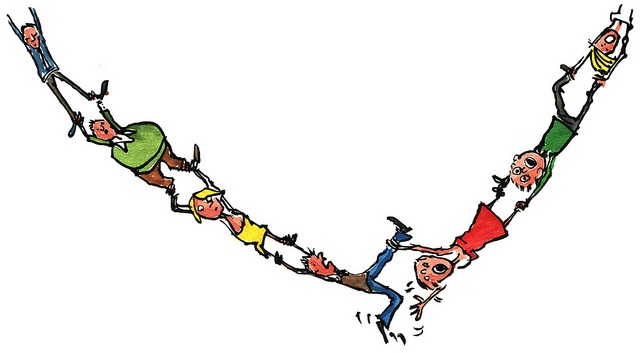The Unmeasured Strength of the Weakest Link
 That weak link — the one you wish you didn’t have to worry about — well, it turns out it could be your most valuable asset. Sociologists are learning that it is the weakest links which drive innovation.
That weak link — the one you wish you didn’t have to worry about — well, it turns out it could be your most valuable asset. Sociologists are learning that it is the weakest links which drive innovation.
Scientists have done studies to identify how new ideas take root and where the sources of great success stories lie. People think it is in fostering alliances and friendships with the like-minded or the movers and shakers — the powerful, the well-connected, the jet set.
The big churches — not the small churches.
Turns out they are wrong. In story after story the sparks of great ideas prove to come from the serendipitous—the people you barely know, from small groups of people struggling with ideas in a very hands-on way.
Read this for an interesting take on how this affects social media.
This is an interesting analysis of the value of networks. Let’s focus on one quote:
“The way networks have their effect is not by getting information from people, but rather by finding people who are interesting and who think differently from you,” —Ronald S. Burt, Neighbor Networks
What does this mean to the Church?
Most congregations are fairly homogenous in membership. Redeemer’s Ambassadors visited 40 in the last 18 months. Only about four had significant diversity — at least visually. We tend to gravitate toward people who are like us, dress like us, and act like us. The minute things start to change, we become defensive. Liturgical dance . . . no way! Tambourines . . . never! The barriers we put up are designed to protect our sense of identity and comfort.
We want to recognize ourselves in the person sitting beside us in church. It is proof to us that we are accepted.
The whole structure of Church is designed for sameness. We rally around one leader and conform our ministries to that leader’s interests and skills. When encouraged to invite others, we invite people like us.
When congregations attempt innovation it is likely to be the same sort of dabbling taking place 10 miles from us. Properly sanctioned innovation.
Redeemer struggled to grow until we began reaching out to people who were different from us.
Then new ideas began to spread. Of course, we were wary of change, but we quickly learned that we didn’t have to change all that much. Change did not have to mean abandoning who we are. We added to our heritage.
With this web site, we continue to find new spins on evangelism. Churches across the country and around the world are sharing with us and we respond. We have learned that Jesus’ commission for us to go out into the world is not so much to make the rest of the world transform to our ways but for US to learn NEW ways from them.
If the Church as a whole wants to change, it must foster relationships with our weakest acquaintances.
Redeemer, through our 2×2 site, has become pen pals with a church in Pakistan and another in Kenya. We’ve helped individuals with projects across our own continent. We’ve learned more in the last four years than in our congregation’s previous 120 years.
This sense of mission may not be for every church, but we encourage you to look at your own “weak links.” Who in your congregation is borderline involved, a bit uncomfortable? Engage them. You may find they have insights and skills to offer that you didn’t know you needed.
Use the power of the web to reach the neglected. One church close to us has studied the needs of families with autistic family members. Because we knew of their interest we were able to introduce them to another ministry designing worship opportunities for the autistic.
This is a golden age for the church. It was never more possible to fulfill the Great Commission. Will we meet the challenge? Or will we continue to reward and encourage the efforts of homogenous ministry?
UPDATE: June 2013. 2×2 now has a network of six churches internationally. They’ve gone out of their way to get to know each other. Our members are in contact with them regularly—often weekly. Locally we’ve visited 62 of our sister churches. They tend to avoid communicating with us but then they all found our property to be of more value to their leaders than our ministry was in our community or the world.
